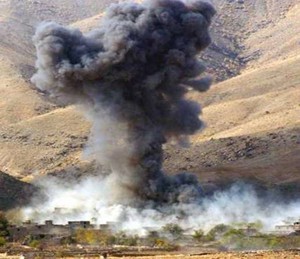ZP Heller

Lory and Lindsay, cheerleaders of the Miami Dolphins, sign bombs heading for Afghanistan, aboard the USS Theodore Roosevelt carrier.

The village of Rahesh in Shomali plain in Northern Afghanistan bombed by US air force.
Since 2001, the US Air Force has dropped nearly 31 million pounds (14,049 metric tons) of bombs on Afghanistan. The UN estimates that US airstrikes alone accounted for 64 percent of the 828 Afghan civilians killed last year. Those numbers practically scream the need to abandon conventional warfare tactics in Afghanistan and dramatically shift US foreign policy to incorporate a more humanitarian approach. Instead, we're seeing the horrific images from IDP camps: refugees who have lost loved ones; parents so desperate they would rather sell their children than watch them starve; children scarred both physically and psychologically. These are the survivors, forced to endure the bleak aftermath of airstrikes as the US escalates this war.
The front page story in the LA Times today examines the US military's seemingly impossible task of reducing the number of civilian casualties in airstrikes like the one that killed up to 140 people in Farah province on May 4. The civilians casualties from that attack, we know from a preliminary investigative report, died because a series of military errors. Had the Afghan forces being trained by the US military not ignored warnings about entering a Farah village, they wouldn't have been ambushed by insurgents, prompting the Marines to call for a strike. And had the pilot of an aircraft not lost site of his target, or had those commanders rethought the need to send in a B-1 bomber strike at a point when those Afghan forces weren't under direct attack, the high number of civilian casualties could have been avoided. Yet as our highly skilled military revisits protocols for conducting air strikes to minimize mistakes like these in the future, these casualties are the inevitable consequences of conventional warfare.
We've heard Gen. McChrystal tell Congress that reducing civilian casualties is "essential to our credibility." We've heard Adm. Mullen claim we need to do "absolutely everything to make sure civilian casualties are eliminated, if possible, or certainly minimized in every situation." But such rhetoric is appallingly disingenuous while Congress simultaneously approves $106 billion in wartime spending with relatively little in the way of economic aid, or when we learn that over a month after the Farah attacks, US commanders have not specified how exactly they plan to reduce the civilian casualties of this war.
Instead of thinking of alternatives to a dangerously flawed military strategy, US commanders are trying to control the narrative about civilian casualties. As Gareth Porter reported this week, Generals Petraeus, McChrystal and others are attempting to win the public relations war. "There are growing indications," Porter claimed, "that [McChrystal's] command is preparing to deal with the issue primarily by seeking to shift the blame to the Taliban through more and better propaganda operations and by using more high-tech drone intelligence aircraft to increase battlefield surveillance rather than by curbing the main direct cause of civilian casualties."
[utube]krHV9iT20zw[/utube]We may not be able to convince our military leaders to abandon their reliance upon airstrikes, but we certainly can take action to help Afghan victims and change US foreign policy. You can directly help the refugees in these IDP camps by contributing to the Revolutionary Association of the Women of Afghanistan (RAWA) through The Afghan Women's Mission. RAWA not only provides emergency relief, but in general they also help Afghans visit doctors and educate women and children to ensure women's rights are respected in Afghan society. Then you can become a Peacemaker, receiving up-to-the-minute information through Brave New Foundation's new mobile alert system whenever there are Afghan civilian casualties, and calling our government to let them know you protest the current foreign policy that continues to militarize and regional political problem.



